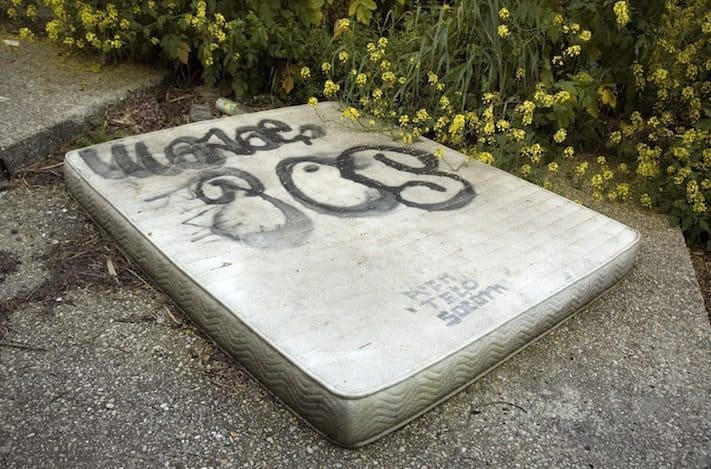
Now that the bill has become a law, there is much work to be done to get the recycling program up and running. ISPA will establish a nonprofit, industry-led organization that will create and manage the new mattress recycling program. The legislation requires that the industry develop a state mattress recycling plan by July 2014.
BedTimes sat down with ISPA President Ryan Trainer and asked him about the law and what it means for the industry:
BedTimes: How long was the process in Connecticut and how did the legislation evolve?
Ryan Trainer: The first Connecticut bill was introduced in early 2012 and it was not something that ISPA or our industry could support. The bill would have saddled mattress manufacturers with the entire cost of funding mattress recycling. ISPA initially opposed the 2012 bill, but once it became clear that legislation would pass over industry objections, we worked with policymakers to improve upon its objectionable provisions. That bill passed the Senate, but the House decided not to take it up with 5 minutes left in its legislative session, causing the bill to die. Soon after, legislators announced their intent to reintroduce mattress legislation during the 2013 session. So, in late 2012, ISPA engaged Connecticut policymakers and negotiated for months to craft sensible legislation that would limit government involvement and create a dedicated funding mechanism, which is supported through a visible fee collected at retail.
BedTimes: What factors and actions allowed ISPA to be successful in negotiating the bill’s content in Connecticut?
Ryan Trainer: ISPA developed a lobbying campaign in the state to educate lawmakers about why an “industry pays” model would not work. The key to our success was the grassroots support of our members, some of whom made multiple visits to the Connecticut Capitol to tell lawmakers that the wrong approach would devastate their businesses. One even hosted his state senator at his plant for an education tour.
BedTimes: How long will it take for the Connecticut law to be implemented?
Ryan Trainer: It won’t happen overnight. Now that the law has been enacted, the first step is that our industry needs to create a nonprofit organization that will be responsible for developing the mattress recycling program in the state. This organization will work on behalf of mattress manufacturers to set up an efficient program and the organization must submit a program plan to the state by July 2014. One part of the plan development includes setting the fee that consumers will pay each time they purchase a new mattress and then having Connecticut approve the plan. After that, we start recycling. It’s not quite that simple, but that is when we’ll really start seeing things come to life.
BedTimes: How will the system be regulated?
Ryan Trainer: Connecticut has to approve the plan that the nonprofit organization establishes. Once it’s up and running, the nonprofit organization will submit regular reports and audits to the state for review.
BedTimes: What role will ISPA have in Connecticut moving forward?
Trainer: In the coming months, ISPA will be creating a nonprofit entity responsible for developing and administering the program on behalf of manufacturers. ISPA will work with retailers, manufacturers and other stakeholders in developing the plan.
BedTimes: Is there an existing infrastructure that can manage the new demands for recycling that this law will generate?
Ryan Trainer: Retailers collect large quantities of discarded mattresses when they deliver new products to consumers. We plan to work with these retailers to utilize their existing collection system for the benefit of the recycling program. Currently, Connecticut has two recycling facilities, and we feel that there is sufficient infrastructure for us to get started, but we expect that the private sector interest will grow.
BedTimes: How will the Connecticut legislation impact ISPA’s efforts in California and other states regarding mattress recycling?
Ryan Trainer: The legislation in Connecticut will have an effect on any state that considers this issue. We now have a program that lawmakers know the industry is able to support. The Connecticut law and legislation under consideration in California and Rhode Island all are designed to allow the same, single entity to set up and run a mattress recycling program in each state. The exact details may vary some from one state to the next, but we are working to make them as practical and efficient as possible.
BedTimes: What can mattress manufacturers, suppliers and retailers do next?
Ryan Trainer: The key is industry involvement and good communication. We will continue to work collaboratively with governments to make sure we meet our responsibilities without permitting too much government involvement. ISPA will provide regular updates as the new entity is formed and work begins. If you sell in Connecticut, stay tuned to ISPA publications, including BedTimes, for information on how you can be involved. We won’t be shy about asking for your help. Now is the time for all of the industry to get involved. If you have questions or want to know how you can be more involved, we encourage you to contact the ISPA offices at 703-683-8371.




